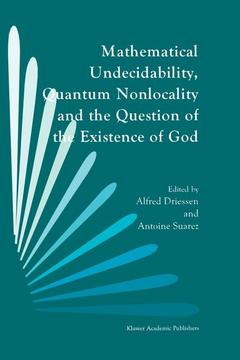Mathematical Undecidability, Quantum Nonlocality and the Question of the Existence of God, Softcover reprint of the original 1st ed. 1997
Langue : Anglais
Coordonnateurs : Driessen A., Suarez Antoine

On January 22, 1990, the late John Bell held at CERN (European Laboratory for Particle Physics), Geneva a seminar organized by the Center of Quantum Philosophy, that at this time was an association of scientists interested in the interpretation of quantum mechanics. In this seminar Bell presented once again his famous theorem. Thereafter a discussion took place in which not only physical but also highly speculative epistemological and philosophical questions were vividly debated. The list of topics included: assumption of free will in Bell's theorem, the understanding of mind, the relationship between the mathematical and the physical world, the existence of unobservable causes and the limits of human knowledge in mathematics and physics. Encouraged by this stimulating discussion some of the participants decided to found an Institute for Interdisciplinary Studies (lIS) to promote philosoph ical and interdisciplinary reflection on the advances of science. Meanwhile the lIS has associated its activities with the Swiss foundation, Fondation du Leman, and the Dutch foundation, Stichting Instudo, registered in Geneva and Amsterdam, respectively. With its activities the lIS intends to strengthen the unity between the professional activities in science and the reflection on fun damental philosophical questions. In addition the interdisciplinary approach is expected to give a contribution to the progress of science and the socio economic development. At present three working groups are active within the lIS, i. e. : - the Center for Quantum Philosophy, - the Wealth Creation and Sustainable Development Group, - the Neural Science Group.
I: Mathematics and Undecidability.- 1. How can or should the recent developments in mathematics influence the philosophy of mathematics?.- 2. Number and randomness: algorithmic information theory — new results on the foundations of mathematics.- 3. Meaning, reality and algorithms: implications of the Turing theorem.- 4. The limits of mathematical reasoning: in arithmetic there will always be unsolved solvable problems.- 5. Mathematics: a pointer to an independent realityPenrose’s interpretation of the Gödel and Turing theorems.- II: Physics and Nonlocality.- 6. A critical approach to complexity and self organization.- 7. Indeterminism and nonlocality.- 8. Nonlocality and the principle of free experimentation.- 9. Optical tests of Bell’s theorem.- 10. Nonlocal phenomena: physical explanation and philosophical implications.- 11. Quantum theory: a pointer to an independent reality. Adiscussion of Bernard d’Espagna’s “veiled reality”>.- III: Science, Meta-Science and the Existence of God.- 12. Scientism and scientific knowledge of things and God.- 13. Physics and the mind of God.- 14. The question of the existence of God in the book of Stephen Hawking: A brief history of time.- 15. Final remarks: becoming aware of our fundamental limits in knowing and doing, implications for the question of the existence of God.- Notes on Contributors.
Many students and researchers feel the need of philosophical reflection on recent progress in the understanding of mathematics and science and in particular physics. Aware of the traditionally monodisciplinary approach at most universities, this book tries to stimulate this reflection by offering a series of invited contributions -- written mostly by scientists -- with a more or less pronounced philosophical content. Due to the variety of contributors the book cannot present a complete and coherent picture of this exciting field, but it will indicate in some examples that for a full understanding of reality besides the contributions of science a philosophical reflection is strictly necessary. The book presents recent scientific results indicating that human beings will never reach a comple
Date de parution : 11-2012
Ouvrage de 227 p.
16x24 cm
Mots-clés :
© 2024 LAVOISIER S.A.S.



